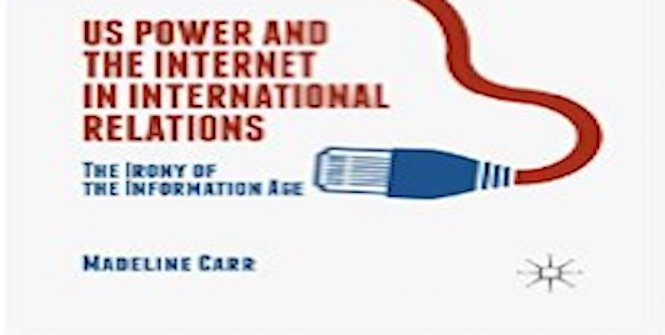Reading Room: US Power and the Internet in International Relations

The need to understand the intersection between international relations and technology theory is more important than ever. While one book cannot cover all angles, this one manages the highly relevant ones with selective flair.
Madeline Carr is an accomplished scholar in International Politics and the Cyber Dimension at Aberystwyth University, United Kingdom. Her book, US Power and the internet in international relations: The Irony of the Information Age, takes the reader on a candid journey of exploration as to whether “those factors that reinforce state power outweigh those factors that undermine it”.
The book explores the intersection between international relations and technology theory, then turns to a political history of the Internet. This broad approach narrows into three specific subsequent branches: cyber security, internet governance and network neutrality.
Carr provides an informative outlook on international relations in the modern cyber era. Approaching this through the lens of American hegemony is logical given that the example of the superpower is central to any theoretical foundations one would try to set in the field of global Internet governance.
The main argument of the book is navigated skilfully and consistently, reiterating Carr’s position that no single analysis fits all cases, and that the history of the Internet is central to shaping its future. As is to be expected, however, the book cannot cover all relevant angles, though it manages to cover highly relevant ones with remarkably selective flair. A more in-depth economic analysis or counter examples of other nations to compare with the US stance may have been useful to strengthen the argument, but would also likely have added more chapters to the book.
It is particular worth highlighting the book’s discussion of network neutrality, currently a hotly-debated topic. The book takes a less traditional approach, in that it establishes that “conceptions of power are influential in shaping technology only when associated with a social constructivist approach to technology”. Yet it states that this is not applicable in the case of network neutrality, with invested politicians drawing on external sources of authority. This new insight produces a very interesting angle of analysis, engaging with a complex story of legitimacy and implications for US power internationally.
This book presents a genuine and systemic study that answers many questions but also raises others in order to challenge and inspire further research. Carr’s work thus serves as an intellectual springboard, unique in its three-pronged model. It is solidly researched, well-argued and impeccably written in a true academic style, but without some of the excessive international relations polish many scholars insist on trying to shine their pieces with.
Carr has produced an honest account of power in the information age. It is certainly worth a read for those contemplating the complex nascent field of IR in the era of cyberspace. People would likely enjoy it both at the start of their academic journey and further into it, as a way of seeking perspective. The book’s qualities allow it to also lend itself to interesting debate around where the US power is headed and, indeed, its relevance altogether.
Madeline Carr, US Power and the Internet in International Relations – The Irony of the Information Age, England: Palgrave Macmillan, 2016. ISBN – 13: 978-1137550231
Ana Stuparu is a PhD Candidate in cyber security strategy at the National Security College, Australian National University. She is a former intern at AIIA National Office.





